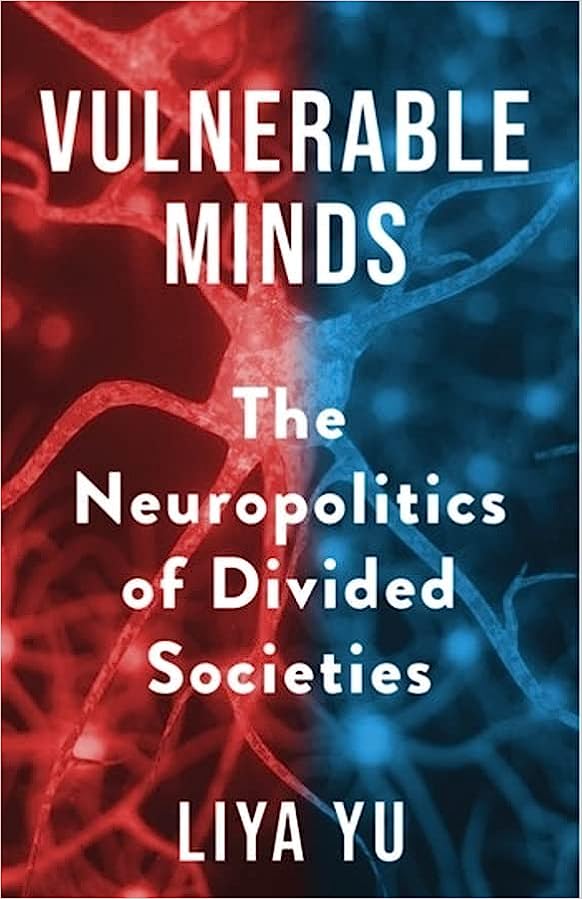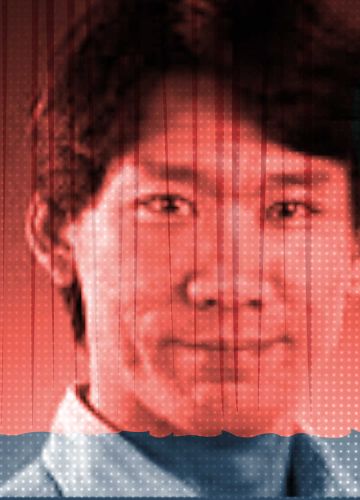Defending Liberal Democracy with Neuroscience

Ryan Ho Kilpatrick

Liya Yu
Ryan Ho Kilpatrick: The preconception I had going into your book knowing it would explore dehumanization is that it would be about the precursors to mass atrocities because I thought that dehumanization is something only monsters do. But you lay out how this is something we have a very natural capacity for, that we do all the time, and sometimes is even necessary. Can you explain what you mean by dehumanization?
Liya Yu: You were actually right to think of dehumanization as atrocities that only so-called monsters commit because the first wave of dehumanization research was exactly framing it as such. A lot of this was from Holocaust survivors or second-generation Holocaust survivors in the US. But the way I look at dehumanization now, using new research methods coming from neuroscience, is to look at it as a brain capacity. And that means that in order for us to make it through one long day and be successful at it, we need to dehumanize certain people in order to get on with our day. Evolutionarily, it made sense: we needed to very quickly distinguish between who was in our in-group and who was in our out-group. And so dehumanization, I think, is a very helpful and powerful lens through which to look at exclusion in our time.
In a time when people don’t admit to [being racist or sexist], dehumanization is a very powerful lens through which to still detect it.
In our post-Cold War, somewhat liberal world order, it is actually not okay to publicly call yourself a racist, to publicly call yourself a sexist. If you look at people on the far right from Trump to Orban, none of these people would call themselves openly racist. They call themselves nationalists, patriots, etcetera. So in a time when people don’t admit to the egregious exclusions that, of course, are still going on, dehumanization is a very powerful lens through which to still detect it.
Dehumanization is important in a political context because in order to make meaningful and stable ties with people — whether that be in our communities or even diplomatically at the international level — you need to be able to humanize somebody else. I like this brain approach because it’s not moralizing. It’s not saying “You need to be a nice person; you need to just see everybody as your friend.” That’s not what I’m saying with this. My neuropolitical framing of humanization is very much located in brain agility and ability.
RHK: Growing up in this post-Cold War, End-of-History world you alluded to, we were often led to believe that liberal democracy is the natural state of the world, the system all humans gravitate toward. But you make the case that, actually, liberal democracy is exceptionally difficult to achieve and maintain. What makes it such a challenge?
LY: That’s a very good question. So I argue in my book that the liberal brain is one of the biggest cognitive challenges of our time — upholding the liberal brain. Liberal values such as inclusion, tolerance, diversity, and multiculturalism are all values that might be easy to affirm. But it’s actually very hard to maintain every day over time because our brains naturally form in-groups very quickly. Sometimes these in-groups are irrational. So in our modern world, we often need to cooperate with a diverse group of people, and often we need to change these allegiances over the course of a very short time span. Now, our brains are really not used to this. Our brains are also not used to dealing with difference as something that is pleasant.
The liberal brain is one of the biggest cognitive challenges of our time.
Studies in political neuroscience on conservative versus liberal brains, especially in the US Republican versus Democrat context, showed that people who lean more on the Republican side would be disgusted by certain cultural triggers that are novel to them like unfamiliar smells. Not even very political things at first glance. But there’s a kind of cognitive preference for sameness, for continuity, for not trying new things out. And liberal democracy is all about embracing, to a certain degree, people who you don’t agree with. So I think in this context, we could also say that the liberal brain is not just a challenge for those who live in liberal democracies but also for those who are sort of at the threshold of potentially transitioning into liberal democracies. Because it asks a lot of people. My argument is that politicians and educators and political analysts underestimated the cognitive challenges that come with it. And we maybe need to rethink the language with which we approach people and tell them what is in it for them.
RHK: Civilizational discourse has recently become ubiquitous in China. We recently wrote a piece on “Xivilization,” the portmanteau the Global Times invented for what Beijing is now calling a new model for civilization guided by Xi Jinping’s thought. The implication is that the CCP doesn’t just represent a competing ideology but a competing civilization. What are some of the dangers in this way of thinking, in assigning institutional differences and points of friction in international relations to innate and insurmountable cultural differences between insular, exclusive entities?
LY: I speak in my book about Huntington’s Clash of Civilizations and how there is specific research on civilization and dehumanization. When you say you’re more civilized than somebody else, you are kind of saying that you’re farther removed from the apes, so to speak. And so in this whole research field, they linked this to behavioral consequences, which is intergroup violence. They tested this. People were less willing to make peace with each other if they felt that they were dehumanized in this kind of civilizational way. And so I would say the international community needs to really wake up in terms of the language that we use and the concepts that we use, including, Huntington’s polemic about civilizational clashes. If Chinese people hear that and they feel that they’re seen as less civilized, their behavioral response will actually be more defensive and aggressive than if they just felt disliked by an individual Western white person.
[Civilization discourse] is, of course, very smart of Xi Jinping because he is creating an in-group identity that’s very sticky in our brains. It’s not just about abstract CCP values. It’s about history. It’s about your place in it.
I would say this civilized version that you mentioned is, of course, very smart of Xi Jinping because he is creating an in-group identity that’s very sticky in our brains. It’s not just about abstract CCP values. It’s about history. It’s about your place in it. It’s about Chinese people having suffered in that history under colonialism. It’s about Chinese people rising again. And so at the brain level, all of that really plays into people’s need for inclusion in the Chinese context and the shame of having had to try to be Western because, you know, I think we all experience this.
I’m German Chinese. I identify as German, really. My parents immigrated to Germany from China. But of course, I never fit in because I don’t look German. I’m a second-generation immigrant. And so first, you know, you try to be white, you try to fit in, and then you start to resent that self that did that. So basically, I’m just describing at the micro level what happens then at the macro level. And then you just need somebody to come in at that moment when you feel that resentment and say, “Hey, I have this other identity for you.”
I would add to this that the whole civilization discourse is inherently dehumanizing because in order to elevate yourself, and your own civilizational status, you have to dehumanize others. To an extent, that’s the dynamic. But traditional leftist and liberal frameworks of analysis against racism and exclusion would be unable really to lay the finger on this. This is why I came up with my theory. Why is Huntington still so successful and why do a lot of liberal people in DC also support this theory? Because it’s not so obviously racist. It’s not so obviously politically incorrect. But with a dehumanization lens, I think you can say no, it’s actually problematic for this and that reason.
RHK: Why do you think we need a new social contract?

LY: I think a lot of people are actually currently in what US researcher Daniel Yudkin calls the “exhausted majority.” Although our societies seem very polarized on both of these sorts of extreme ends, a lot of people are in this exhausted majority. The social contract is literally trying to pitch to people why they should join this liberal democratic project. That means that if you join, you have to make certain sacrifices. You will lose something, but you will gain something else. And I think why right-wing populism, and also people who are touting Chinese authoritarianism as a more effective way of governance — why they are successful is because liberals have failed for a long time to pitch the social contract successfully to that exhausted majority. People ask, “Well, what’s in it for me? You just basically want me to say I’m a bad person because I’m by virtue of being white, I’m a bad person by virtue of being a man.”
I think that as much as identity politics has been important in driving movements, it actually has been quite toxic in a social contract context in convincing people what’s in it for them. Because a lot of the current culture wars don’t really try to pitch to the other side, to say that maybe you don’t belong to this particular identity we’re fighting for the rights of, but actually you need to support us because it’s in your interest, because the alternative, as Hobbes would say, is complete chaos.
RHK: In Vulnerable Minds, you write about how, instead of discussing what unites and divides us, you want to talk in terms of universals. How do you respond to the charge that there are no universal truths to the human experience and saying there are implies a form of hegemony?
LY: This is where I come in with my identity as an Asian woman. The reason why I wanted to create this kind of theory in the first place is because I felt excluded. My field, especially political philosophy, is very white and very male. I always knew that I wanted to go to the heart of power to change the inequality that I had experienced, because I knew that the radical exclusion that comes with racism and sexism that I had experienced as an Asian woman in the West could only be countered with a radical kind of inclusion.
I knew that the radical exclusion that comes with racism and sexism that I had experienced as an Asian woman in the West could only be countered with a radical kind of inclusion.
I’m just as critical of that kind of hegemonic universalism as my friends on the left are. But I came up with a new universalism in which I wanted to be radically included as an Asian woman, up from a kind of biological layer of my existence.
I know that a lot of people have issues with neuroscience methods and the claims that they make, which is why in my book I dedicate a whole chapter to methods. It sounds kind of dry, but I think it’s also kind of exciting because I speak about the historical context, how those methods and social neuroscience developed in the wake of the civil rights movement. I know that I have a lot of critiques of this, my universal approach, but I would just say maybe two things.

I’m not using neuroscience in a deterministic or reductionist way. In fact, I haven’t really met any social neuroscientists who would do so. They all say we need context. But for me it’s empowering to know what what the brain does. My students with minority backgrounds, when I taught in the US, would never question why it’s important to universally understand what happens in the brain of the excluder because when you get arrested by the police as a young black man and you sit in the back of the car, you know how to maybe humanize yourself — some strategies how to humanize yourself, such as, you know, something as innocuous as some stating your vegetable preferences or just, you know, talking about your own life and your stories. So to me, in the end, it’s actually white privilege on the left. There are some on the left who are very hostile to psychology, very hostile to neuroscience, and I ask you what privilege in your life allows you not to need to know what happens in the brain of your excluder.
RHK: Your work mainly attempts to understand the rise of far-right movements in the West, but what has relevant research taught you about the phenomenon of online pro-authoritarian leftists, or “tankies,” in Western liberal democracies?
LY: What always struck me with tankies is that they actually dehumanize Chinese people — often very explicitly so and without being aware of it at all. I mean, they’re not that different from Stalinist back in Russia or Maoists who would say, well, we need to sacrifice so many people for my ideology. They’re just super ideological. And I think what my neuropolitical theory offers is breaking through ideologies. It allows us to think from within our brains, saying neither that our brains are very good or very bad. It’s more looking at the capacities that we have and, given the capacities that we have, what kind of society can we achieve or do we want to achieve? It’s also about, well, here you have to set yourself some goals. And with tankies, of course, it’s very much so that they the goals have already been set by their ideology. And so they need the reality to fit ideology. This is very typical of how our brains work. It’s a need for control.
If we try to humanize tankies for a moment, why do they do it? They feel overwhelmed by a certain social economic order that they live in. They are very frustrated with US imperialism, with the way the US capitalist market works, and they see injustice… I mean, just to be fair to them and also so that we can eventually roll them back into our common project because otherwise the alternative is mutual destruction, right? So I have some faith in tankies that, maybe, when you tell them basically, I humanize you, I understand your thoughts, your motivations behind your frustrations — and that you actually are motivated by a sense of justice. Many of them are, but then when they apply that sense of justice to China, Chinese people don’t count. It’s just about how it fits into their own experiences of misery in the West and I think I would say in this context also — because I talk in my book about teaching pro-Trump students in Virginia in 2016 — what’s really very counterproductive for our brains is shaming and basically dehumanizing you, putting you in a category of just being dumb.
Offer them humanizing stories of Chinese people in China that would challenge their ideologies. I believe that some of them will not respond, but some of them might or some of them might feel, hey, this person is somewhat on my side and at least getting my motivations.
RHK: What role can the media play in helping to humanize each other?
The media has a lot of power over framing people and situations in a humanizing way.
LY: The media has a lot of power over framing people and situations in a humanizing way. A Norwegian study showed that disgust-based framing of Roma refugees in the media led to an increase in support for hostile refugee policies in people. Disgust is usually a neurocognitive trigger for dehumanization, meaning that it can lead to dehumanization of an out-group, such as if they are associated with disgust-based descriptions about their cleanliness, for example. Describing people as animal-like, machine-like, or their bodies having superhuman qualities can also increase dehumanization. This was highly relevant in the context of Black Lives Matter, where young Black men were framed in police descriptions as having superhuman, hulk-like bodily qualities. If you describe someone like this, you automatically assume that their body is different from others’ and can take more pain, leading to pain-denial in punitive and even medical settings. It’s important that journalists are aware of theses dehumanization triggers, especially because some of them might seem innocuous.
RHK: What new insights have your three years living in Taiwan yielded?
LY: I would say something that we should pay attention to, and that the Western world and white people won’t do for us because it’s not really in their interest, is to talk about intra-dehumanization in Asia. Of course there’s also racism but I think it’s more helpful to put it in dehumanization terms because especially in the Taiwan, China, Hong Kong context, where you have people who share the same or similar ethnicities, people are like, well, that’s not racism, so what is it? And of course, you know, in the bigger East Asian context, there’s so much more to say about dehumanization in Japan, Korea, and all of that. But I think just in this kind of triangle [Taiwan-China-Hong Kong], I have witnessed a rise in dehumanization going hand-in-hand with a rise of authoritarianism in China.
We are at a crucial, very volatile point in geopolitics in Asia where we can’t really afford not to know what’s going on in Xi Jinping’s brain, not to know what’s going on in Chinese peoples’ brains..
I have seen an increase in dehumanization between Taiwanese people and Chinese people. Even commemorating the Tiananmen massacre. There are fewer Taiwanese people coming. A lot of Hong Kong people are keeping it up. There are Taiwanese young people saying, what does this have to do with me? And I get it. I really get it that there’s frustration, but I think our brains have to overcome some of that. It’s called meta dehumanization. Taiwanese people feel dehumanized by China and trying to attack Taiwan and obliterate its existence. And so they’re like, well, guess what? I’m not interested in you either then. But if that leads to a withdrawal of political solidarity, I think it’s not in Taiwan’s political interest. I think it’s not fair that this is put on Taiwanese brains, so to speak, that you have to overcome yourself. But I’m saying that we are at a crucial, very volatile point in in geopolitics in Asia where we can’t really afford not to know what’s going on in Xi Jinping’s brain, not to know what’s going on in Chinese people’s brain — to mentalize them.

Humanizing them doesn’t mean that you love them. It doesn’t mean that you have excessive empathy towards them. It just means you can imagine, what are they thinking? What are they feeling? What are they dreaming about? What is their next move? And currently, I don’t know how many people in Asia are doing that towards China and Chinese people. What’s their next move? And the A4 Revolution (白紙運動) was a great moment of humanization of Chinese people. Very powerful images as well that people could relate to. That was a great like little opening and I think we should do studies to see how that has translated into more humanization.

Ryan Ho Kilpatrick






